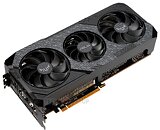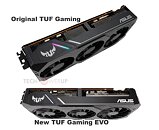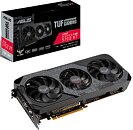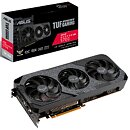- Joined
- Oct 9, 2007
- Messages
- 47,251 (7.54/day)
- Location
- Hyderabad, India
| System Name | RBMK-1000 |
|---|---|
| Processor | AMD Ryzen 7 5700G |
| Motherboard | ASUS ROG Strix B450-E Gaming |
| Cooling | DeepCool Gammax L240 V2 |
| Memory | 2x 8GB G.Skill Sniper X |
| Video Card(s) | Palit GeForce RTX 2080 SUPER GameRock |
| Storage | Western Digital Black NVMe 512GB |
| Display(s) | BenQ 1440p 60 Hz 27-inch |
| Case | Corsair Carbide 100R |
| Audio Device(s) | ASUS SupremeFX S1220A |
| Power Supply | Cooler Master MWE Gold 650W |
| Mouse | ASUS ROG Strix Impact |
| Keyboard | Gamdias Hermes E2 |
| Software | Windows 11 Pro |
ASUS today rolled out the TUG Gaming X3 Radeon RX 5700-series EVO graphics cards. These include the SKUs "TUF 3-RX5700-O8G-EVO-GAMING" for the RX 5700, and "TUF 3-RX5700XT-O8G-EVO-GAMING" for the RX 5700 XT. The two cards feature certain design tweaks over the original TUF Gaming RX 5700-series graphics cards that were criticized by tech reviewers for bad cooling performance. The updated TUF Gaming EVO cards feature an entirely different aluminium fin-stack heatsink from the one in the original TUF Gaming cards, which offers better contact with the various hot components on the PCB.
ASUS also updated the ventilation of the cooler, with three Axial-Tech fans replacing the conventional fans on the original. These fans feature impellers that are webbed at the edges, so air is guided axially (through the heatsink), and some of it isn't bled laterally. The fan in the center is slightly smaller than the ones on its sides. Clock speeds are unchanged between the two revisions, with up to 1720 MHz game clocks and up to 1750 MHz boost clocks for the RX 5700 model, and up to 1795 game clocks and up to 1905 MHz boost clocks for the RX 5700 XT model. Both cards feature a software-based "OC mode" that dials up clock-speeds by roughly 70 MHz. ASUS will replace the original TUF Gaming with the new EVO cards at current prices.





View at TechPowerUp Main Site
ASUS also updated the ventilation of the cooler, with three Axial-Tech fans replacing the conventional fans on the original. These fans feature impellers that are webbed at the edges, so air is guided axially (through the heatsink), and some of it isn't bled laterally. The fan in the center is slightly smaller than the ones on its sides. Clock speeds are unchanged between the two revisions, with up to 1720 MHz game clocks and up to 1750 MHz boost clocks for the RX 5700 model, and up to 1795 game clocks and up to 1905 MHz boost clocks for the RX 5700 XT model. Both cards feature a software-based "OC mode" that dials up clock-speeds by roughly 70 MHz. ASUS will replace the original TUF Gaming with the new EVO cards at current prices.





View at TechPowerUp Main Site




 That man is weird as is. He's not here to discuss anything and you see what he's writing? claiming that AMD doesn't have CUDA, Tensore cores or VRR is a fail for the company is just stupid.
That man is weird as is. He's not here to discuss anything and you see what he's writing? claiming that AMD doesn't have CUDA, Tensore cores or VRR is a fail for the company is just stupid.
